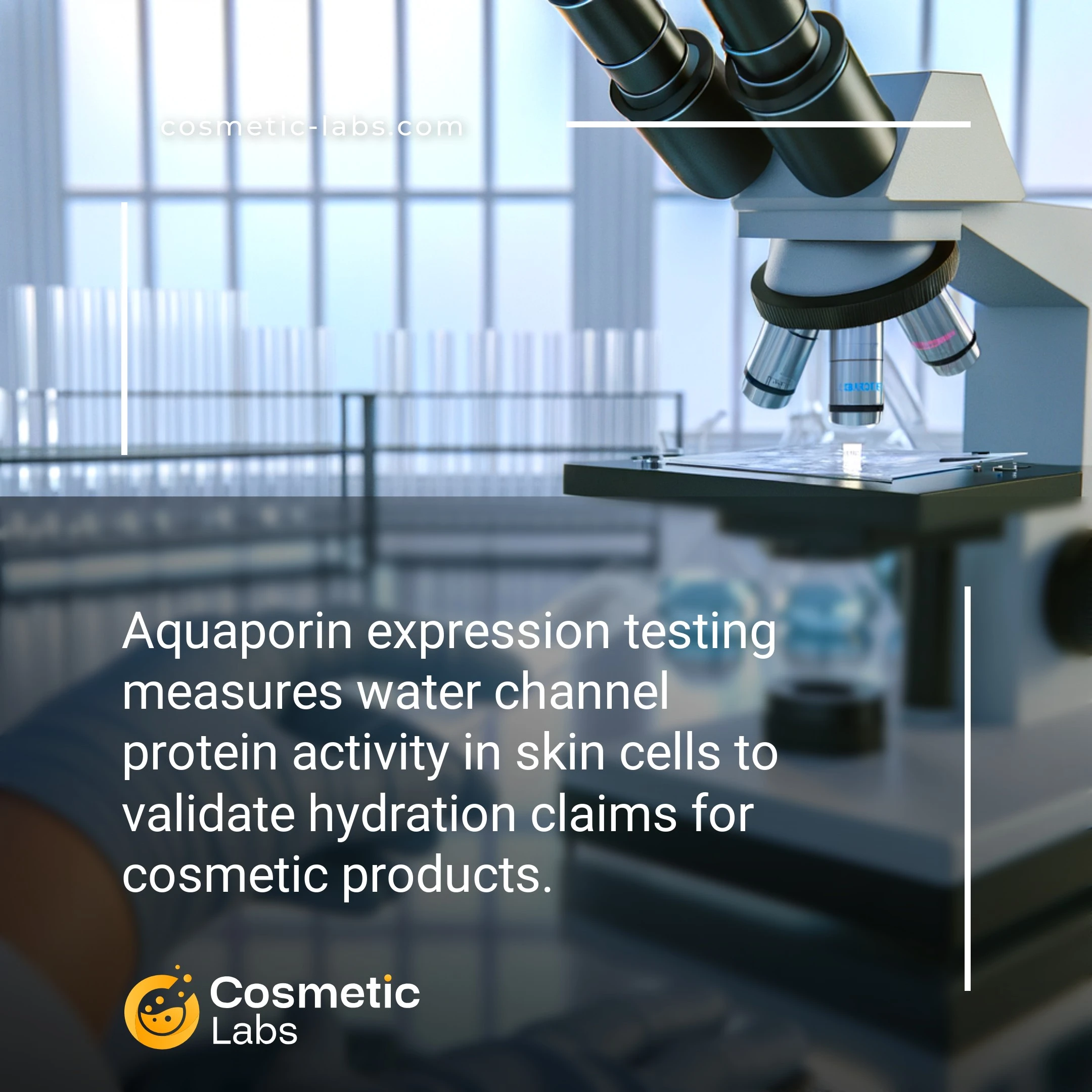Aquaporin Testing Services for Hydration Claims Validation

What is Aquaporin expression?
Aquaporin expression testing for hydration is a molecular analysis that measures how cosmetic ingredients influence water channel proteins in skin cells. Our partner labs use gene expression assays and protein quantification to evaluate whether your formulations boost aquaporin-1 and aquaporin-3 levels, which directly correlate with improved skin moisture retention. This testing provides concrete data on hydration efficacy at the cellular level, helping you substantiate moisturizing claims with scientific evidence that regulatory bodies and consumers trust.
Why do you need this service?
Cosmetic labs use aquaporin expression analysis to validate hydration claims for moisturizers, serums, and anti-aging formulations by measuring water channel activity in skin cells. This testing provides quantifiable proof of ingredient efficacy that supports marketing claims and regulatory submissions, helping brands differentiate their products with scientific backing while reducing reformulation costs through early-stage ingredient screening.
Who provides Aquaporin expression services?
All cosmetic labs providing Aquaporin expression services
There is no company providing these services at the moment.
Aquaporin Expression Analysis for Hydration Testing
Aquaporin expression testing measures how cosmetic ingredients influence water channel proteins in skin cells. Labs use this molecular-level analysis to validate hydration claims and demonstrate ingredient efficacy through cellular water transport mechanisms.
Cellular Water Transport Measurement
Testing labs analyze aquaporin-3 (AQP3) expression levels in keratinocytes after ingredient exposure. This protein regulates water movement across cell membranes and directly impacts skin hydration capacity. Labs typically run 24-48 hour exposure protocols using RT-PCR or immunofluorescence techniques.
Key measurement parameters include:
- AQP3 mRNA expression levels
- Protein localization patterns
- Dose-response relationships
- Time-course analysis
Results help brands substantiate moisturizing claims with cellular evidence rather than surface-level hydration measurements alone.
Ingredient Efficacy Validation
Labs test botanical extracts, peptides, and active compounds for their ability to upregulate aquaporin expression. This testing reveals which ingredients actually enhance the skin’s natural water retention mechanisms versus those that only provide temporary surface hydration.
Testing protocols examine:
- Baseline aquaporin expression in untreated cells
- Expression changes after ingredient treatment
- Concentration-dependent responses
- Comparison with positive controls
Brands use this data to optimize formulations and support regulatory submissions with mechanistic evidence of hydration benefits. Contact labs on our platform to discuss aquaporin testing for your specific ingredients or formulations.
Applications of Aquaporin Expression Testing for Hydration Efficacy
Beauty brands rely on aquaporin expression testing for hydration validation to demonstrate how their formulations enhance cellular water transport mechanisms in skin tissue.
Anti-Aging Product Development
Labs measure aquaporin-3 (AQP3) expression levels before and after treatment with anti-aging formulations containing hyaluronic acid, ceramides, or peptide complexes. This testing reveals how ingredients influence water channel proteins that decline with age. Teams track AQP3 mRNA levels using qPCR analysis over 24-48 hour treatment periods.
Results show percentage increases in aquaporin expression, providing quantifiable data for age-defying hydration claims. Brands use these metrics to support marketing statements about improved skin moisture retention and barrier function recovery.
| Aquaporin Type | Primary Function | Testing Method | Typical Response Time |
|---|---|---|---|
| AQP3 | Water and glycerol transport | qPCR, Western blot | 24-72 hours |
| AQP1 | Pure water transport | Immunofluorescence | 12-48 hours |
| AQP9 | Water and solute transport | RT-PCR analysis | 48-96 hours |
Moisturizer Efficacy Validation
Testing services evaluate how moisturizing ingredients affect aquaporin gene expression in keratinocytes and dermal fibroblasts. Labs expose cell cultures to botanical extracts, humectants, or occlusive agents, then measure changes in water channel protein production. This approach validates ingredient selection for deep hydration formulations.
Protocols typically involve 3D skin models or primary cell cultures treated with test compounds at various concentrations. Results demonstrate dose-dependent responses and optimal ingredient ratios for maximum aquaporin upregulation, supporting product positioning and regulatory submissions.
Ready to validate your hydration claims with aquaporin expression testing? Contact specialized cosmetic labs on our platform to discuss your specific formulation needs and testing requirements.
